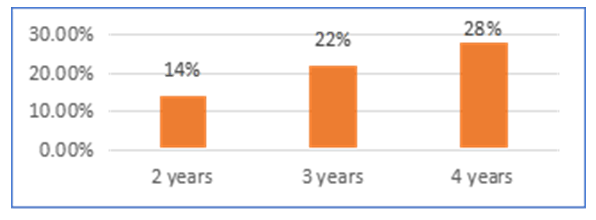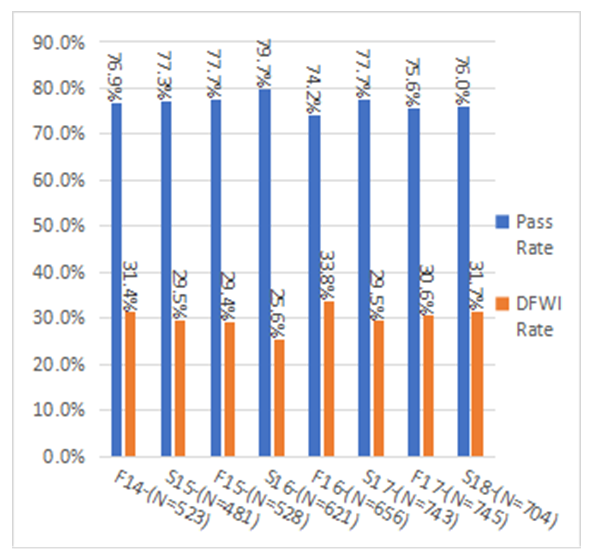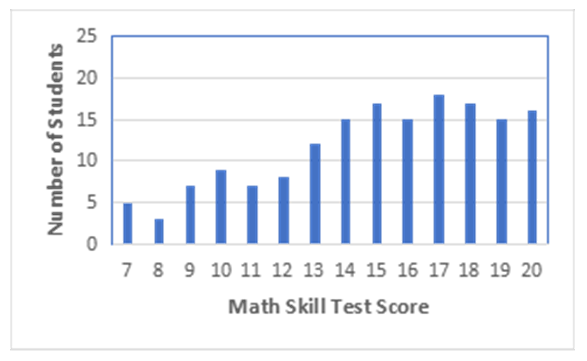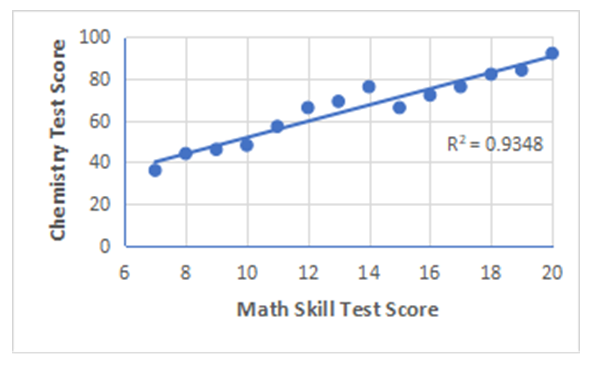-
Paper Information
- Paper Submission
-
Journal Information
- About This Journal
- Editorial Board
- Current Issue
- Archive
- Author Guidelines
- Contact Us
Education
p-ISSN: 2162-9463 e-ISSN: 2162-8467
2023; 13(1): 7-10
doi:10.5923/j.edu.20231301.02

The Impact of Elementary Algebra Skills to Nursing Students’ Success in Community College Chemistry Course
Sumeyra Yumak, Ozgur Ecevit
Science Department, BMCC, CUNY, New York, NY, USA
Correspondence to: Sumeyra Yumak, Science Department, BMCC, CUNY, New York, NY, USA.
| Email: |  |
Copyright © 2023 The Author(s). Published by Scientific & Academic Publishing.
This work is licensed under the Creative Commons Attribution International License (CC BY).
http://creativecommons.org/licenses/by/4.0/

Mathematics plays a crucial and widespread role in the field of chemistry, serving as an indispensable tool for exploring essential chemical concepts. Proficiency in mathematical skills, including the ability to rearrange algebraic equations and exhibit effective problem-solving capabilities, stands out as a fundamental factor in predicting students' success in general chemistry coursework. This study examines the direct relationship between proficiency in elementary algebra and success in nursing chemistry (General, Organic, and Biological Chemistry, CHE121) at the community college level, where SAT scores are not required for admission. The study is based on the hypothesis that students who have a strong foundation in elementary algebra are more likely to perform well in CHE121, which requires a solid understanding of mathematical concepts such as stoichiometry calculations, Avogadro’s number, metric conversion, gas formulas, balancing chemical equations, and formula conversions. The study involved collecting data from a sample of students enrolled in CHE121 at a community college. The results showed a significant positive correlation between elementary algebra proficiency and success in CHE121, supporting the hypothesis. These findings have important implications for educators and students, as they highlight the critical role of mathematics in the nursing chemistry curriculum and the importance of early preparation in basic mathematical skills for success in the field of nursing.
Keywords: Nursing Chemistry, Community College, Math Skills
Cite this paper: Sumeyra Yumak, Ozgur Ecevit, The Impact of Elementary Algebra Skills to Nursing Students’ Success in Community College Chemistry Course, Education, Vol. 13 No. 1, 2023, pp. 7-10. doi: 10.5923/j.edu.20231301.02.
1. Introduction and Background
- A student having a strong Mathematics background can solve chemistry problems involving stoichiometry calculations, Avogadro’s number, metric conversion, balancing chemical equations, and formula conversions easily. However, those students who lack basic Math skills cannot even translate word problems into actual quantitative equations. A chemistry course requires many calculations, and the students can not be successful without basic mathematical skills.The notion of a correlation between chemistry grades and proficiency in mathematics is a well-established and recurring topic within the academic discourse. Several studies showed that those students who achieve higher grades in mathematical tests tend to achieve higher grades in their chemistry course, as well [1-7]. In one study [1], an examination consisting of 84 items was administered to students via mail, accompanied by specific instructions to refrain from using calculators. Subsequently, the students were notified of their performance on the examination and given the opportunity to enroll in a concurrent supplementary course. This supplementary course was designed to provide a comprehensive and concentrated review of the mathematical principles relevant to the examination. Remarkably, a significant proportion of the students who opted for the supplemental course demonstrated successful outcomes in their subsequent chemistry course. At Oberlin College [2], an additional study was undertaken to investigate the association between students' mathematical abilities and their corresponding chemistry grades. To accomplish this, the researchers collected and juxtaposed the grades achieved in Chemistry 101 during the fall semesters from 1987 to 1994, as well as the grades obtained in Chemistry 102 during the spring semesters from 1988 to 1995. These academic records were then compared against the SAT-Math scores of the students. The results showed that the students who scored higher grades on SAT-M tests also scored higher on Chemistry class. In another study [3], a Mathematical test was designed for students to evaluate their ability in converting word expressions into mathematical ones, interpreting the data graphically, differentiating between direct and indirect proportion, and solving multistep problems. The results showed that most of the students who experienced difficulty using simple mathematical formulas also had difficulties for chemistry questions like- metric conversion, balancing chemical equations, expressing solution concentration, and writing formulas from the word equations. Further, students with varying levels of mathematical abilities were grouped in a chemistry laboratory, and the results showed an improved learning experience for all students [8]. Other studies have explored the impact of language comprehension [9] or scale literacy [10] on students' success in chemistry courses. These studies were conducted at four-year colleges that require SAT test for admission.Community colleges are the main gateway to post-secondary education in the United States. According to the recent National Center for Education Statistics (NCES) data, 42% of all first-time freshman college students in the United States are enrolled in two-year institutions. However, the percentage of the community college students who earn a degree even after four years is only 28% (Graph 1) [11]. One major reason for such low community college completion rates is remedial courses.
 | Graph 1. Graduation rates for students obtaining an associate degree from a public community college within 2, 3 and 4 years. (Source: https://nces.ed.gov/pubs2019/2019144.pdf) |
 | Graph 2. CHE121 DFWI and Pass Rates between Fall 14 and Spring 18 (Source: BMCC Office of Institutional Effectiveness and Analysis) |
2. Study Design
- CHE121, General, Organic, and Biological (GOB) chemistry, holds a notable position within the Science Department at Borough of Manhattan Community College (BMCC) due to its substantial size and enrollment statistics. Each semester, this course attracts approximately 700 students across around 30 sections, making it one of the largest offerings in the department. Importantly, CHE121 serves as a crucial entry point into the nursing program, often serving as the initial science course for pre-nursing students. This 4-credit course demands a significant time commitment of 6 hours per week, with two sessions per week consisting of a 3-hour lecture, either in person or online and a corresponding 3-hour laboratory component. In order to investigate whether there is a correlation between math skills and success in a nursing chemistry class among community college students, we designed a math skill test consisting of 20 questions to evaluate mathematical areas frequently used in the CHE121 course. The test is not intended to measure overall mathematical knowledge or achievement but rather focuses on questions selected specifically for their relevance to the general chemistry course taught at BMCC. For instance, many questions involve rearranging equations, using conversion factors, scientific notations, and elementary algebra. These skills are essential for students to excel in the CHE121 course, as they are foundational for understanding and solving chemical problems.Table 1, presented below, displays sample questions used in the math skill assessment test and their applications in the CHE121 course.
|
3. Results
- The data analysis was conducted using the math skill test results of 168 students and their corresponding average chemistry test scores. The same chemistry tests were administered across seven sections of the CHE 121 course, instructed by two different instructors. During the data analysis, the focus was solely on the students' test scores. Lab grades, which often incorporate assessments of group work and online homework assignments, were deliberately omitted to maintain a clear focus on the relationships between students' chemistry test scores and their math skill test scores.The math skill test comprised exclusively of multiple-choice questions intricately linked to the foundational concepts and formulas taught in CHE 121. The math skill test score represented the sum of correctly answered questions, scaled on a range from 0 to 20. Graph 3 shows the broadly distributed math skill test scores of 164 students. At the high end, about 29% of students scored 18-20 points missing ≤ 2 questions. On the other hand, about 24% of the students answered ≤ 12 questions of the 20 questions correctly.
 | Graph 3. Distribution of Math Skill Test Scores for 164 Students |
 | Graph 4. Average chemistry test scores vs. Math skill test scores |
4. Discussion
- In the context of general chemistry courses, students' performance is notably enhanced by possessing prerequisite skills. Our research emphasizes the significance of mathematical proficiency, characterized by the ability to execute fundamental mathematical operations, perform algebraic rearrangements of formulas, and master numerical scales and basic calculation principles. Our study reveals a noteworthy outcome: students who demonstrate a higher level of mathematical proficiency consistently excel in nursing chemistry courses at the community college level, where SAT scores are not a prerequisite for admission. The math skills test emerges as a valuable tool, providing an early assessment of student capabilities and forecasting their performance in CHE 121, the nursing chemistry course.This study was conducted exclusively within a singular academic institution, and both course tests and the math skill test were tailored in-house, specific to this institution. However, prior research [12] has suggested that the utilization of the tests even only the first test, irrespective of institutional variations, holds potential for predicting academic achievement in a chemistry course. The accessibility and effectiveness of the internally developed math skill test as a prognostic tool for a first-semester nursing chemistry course render it an appealing choice for early identification of students at risk of course failure, especially in comparison to less accessible metrics such as SAT/ACT scores, which are not mandatory for community college admission. When feasible, the integration of students' GPA data alongside their math skill test scores can further enhance predictive accuracy in identifying these at-risk students.The insights gained from this study can be a valuable resource for advising students. It is essential for all general chemistry students to appreciate the importance of mathematical skills, including the ability to work with algebraic equations, scientific notations, and conversion factors. For students who may have lower math skill test scores, it's crucial to convey that they can still succeed in a chemistry course. They need to find ways to bolster their mathematical abilities, as this plays a key role in achieving high grades. Recognizing the vital role of mathematical proficiency in chemistry, colleges can consider offering engaging workshops or mini-courses during winter or summer sessions for students with lower math skills. These tailored programs can effectively sharpen students' chemistry-related math skills, equipping them with the essential tools for success in chemistry courses. Furthermore, instructors can play a pivotal role in supporting students' math skill development. Allocating a mere 10-15 minutes of instructional time each week at the start of the class to revisit and reinforce crucial math skills pertinent to the upcoming chemistry topics can make a substantial difference. This proactive approach ensures that students enter their chemistry coursework well-prepared and confident. Such practical measures not only enhance academic outcomes but also contribute to overall student satisfaction and success.
 Abstract
Abstract Reference
Reference Full-Text PDF
Full-Text PDF Full-text HTML
Full-text HTML